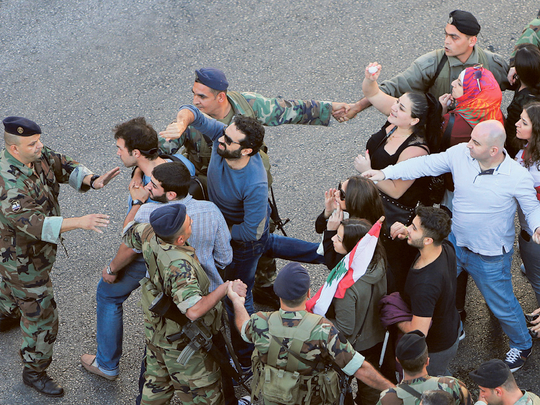
Beirut: Wily politicians shed crocodile tears as they cast a fast vote to repeat their 2013 feat for the second time in as many years. On Wednesday morning, Lebanese representatives last elected in 2009 extended their terms in office by two years and 7 months, or until June 20, 2017. A total of 95 deputies out of 128 voted for the extension. Two key Christian constituents, Michel Aoun’s Free Patriotic Movement (FPM) and Amin Gemayel’s Phalange Party, were the holdouts. The FPM boycotted the session while the Phalange attended but voted against the extension. Sulaiman Franjieh’s Marada Movement representatives voted for but the two Armenian Tashnag Party deputies cast negative votes.
Eerily similar to the May 31, 2013 extension, when 97 “legislators”—who seldom legislated—voted in favor of a first 17-months extension in a session that then lasted 10 minutes, parliamentarians felt no compunction to re-appoint themselves to office. On June 20, 2017, and bearing unforeseen circumstances, current deputies would have “served” for a total of 8 years and 3 months [the additional time due to scheduling overlaps].
Comically, both March 8 and March 14 factions debated the almost-certain-to-pass extension of this new mandate, with equal zeal. Some blamed the FPM of hijacking the extension, ostensibly to gerrymander the pending presidential vote, while others feared for the Constitution.
According to Fadi Karam, a deputy representing the Lebanese Forces (LF), the FPM leader “Michel Aoun is trying to change the current political structure in order to reach the presidency, through marketing the tripartite theory and changing the whole structure of the Lebanese formula.” This was the reason why Aoun rejected Parliament’s extension, Karam believed, as the General apparently attempted to push for a constitutional conference that would establish a new tripartite power-sharing model between Sunnis, Shiites and Christians.
FPM representatives denied the scheme with deputy Abbas Hashim putting the onus on the LF and Phalange. Hashim called on Christian leaders to agree with Aoun over the means of managing the transitional phase that would follow the extension of Parliament because, he clarified, the FPM rejected the notion of a tripartite power-sharing model.
Whether this was the whole story remained to be determined as several speeches delivered in Australia this past week by the head of the Maronite Church, Patriarch Mar Bisharah Butros Al Ra‘i, warned against any hint to change in the country’s power-sharing governance formula between Muslims and Christians. The Cardinal did not mince his words when he concluded that such a move would violate the Constitution and the National Pact that guaranteed equal rights and representation for both Muslims and Christians.
For now, Speaker Nabih Berri maintained that a quorum for the Wednesday session was secured, which further confirmed that politicians bargained the country’s democratizing fate behind closed doors in a process that safely ignored citizen grievances. In effect this meant that a “deal” was reached even if the FPM’s Ebrahim Kanaan, a Aoun spokesperson, announced that the bloc reached a final stand to boycott the actual vote. The decision illustrated Hezbollah’s failure to persuade its March 8 ally to join the party and cast cast pro-extension ballots. For his part, Amal deputy Ayoub Humatid opined that Beirut “approached a unpopular undemocratic decision in the coming days,” as he stressed on the need to preserve Lebanon from a “fatal vacancy.” It was unclear whether the pro-Berri “lawmaker” referred to the implications that Parliament would join the Presidency in posting “vacancies” or whether he simply referred to coming difficulties to reelect Berri as Speaker.
Although Lebanese parliamentarians extended their terms in office several times at the height of the Civil War, doing so in peacetime did not augur well. Naturally, many argued that doing so avoided a total collapse of national decision-making institutions, though few citizens were persuaded that the effort was serious. They pointed to Parliament’s performance during the past 17 months as evidence that elected officials again and again fell below par.












